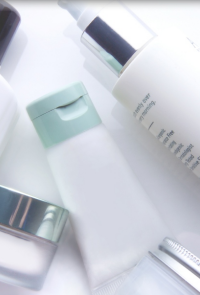
|
|
Rosacea Treatment:
|
|
|
|
|
Non-Comedogenic Cosmetics
Non-comedogenic cosmetics play an important role in minimizing breakouts of pimples, which are a feature of acne and rosacea. Products with this label have been tested to be less likely to produce whiteheads, blackheads, or pimples.
It's important to note that while non-comedogenic products are tested to be less likely to cause pimples or comedones (blackheads and whiteheads), each individual's reaction is different. No product is guaranteed to be non-comedogenic, and products that are fine for some may induce pimples in others. A variety of cosmetics like moisturizers and cleansers have the label "non-comedogenic" or less commonly "non-acnegenic" is used to describe products that have less ingredients which are thought to contribute to acne formation.
Cleansers:
- · Stronger cleansers like traditional bar soaps and synthetic detergents are preferable
- · Acne cleansers have ingredients like benzoyl peroxide which help to contain the growth of new pimples or comedones
Moisturizers:
- · Many non-comedogenic products are oil-free and have thinner consistency
- · For those with extremely oily skin, moisturizers may not be necessary
Sunscreens:
- · Sunscreens with a thicker consistency can sometimes clog the pores
- · Gel formulations tend to be less likely to cause acne
Foundations:
- · Foundations can hide blemishes or more general redness common in rosacea, but they can sometimes cause acne
- · Titanium dioxide allows for better and thicker coverage, and does not contribute to acne formation
Although redness is usually the main concern for those with mild rosacea, pimples can be an issue for those with inflammatory rosacea. If acne-like pimples are a problem for you, using non-comedogenic products may reduce the risk of worsening these symptoms.
|